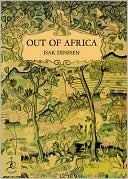 I thought I knew what this book was about. After all, I watched the Sydney Pollack film: the romance between Meryl Streep and Robert Redford, the struggle with the coffee plantation, the final touch of grief at the end. I was prepared for differences — and after all, I watched the movie more than fifteen years ago — but as I settled in to read, I was confident that I knew what was coming.
I thought I knew what this book was about. After all, I watched the Sydney Pollack film: the romance between Meryl Streep and Robert Redford, the struggle with the coffee plantation, the final touch of grief at the end. I was prepared for differences — and after all, I watched the movie more than fifteen years ago — but as I settled in to read, I was confident that I knew what was coming.
I could not have been more wrong. Isak Dinesen’s Out of Africa is not a love story between a man and a woman. It’s not the story of a woman’s struggle with colonial rules, or her fight to grow coffee. It’s a love story, all right: the story of Dinesen’s love at first sight, and ongoing, passionate affair, with Africa itself, its land and people.
 Isak Dinesen is the pseudonym for Karen Blixen, a baroness from Denmark who came to Kenya with her husband to grow coffee. They divorced; she couldn’t bear to leave the land, and stayed when almost any other woman in her position would have accepted a different settlement. There isn’t a single mention of these events in her memoir. Instead, the pages are filled with vivid, powerful memories of her observations of the land near the Ngong hills, the Kikuyu people who lived on and around her farm, the Masai warriors she knew, the lions she killed to keep them from her cattle, the gazelle she once tamed to eat from her hand.
Isak Dinesen is the pseudonym for Karen Blixen, a baroness from Denmark who came to Kenya with her husband to grow coffee. They divorced; she couldn’t bear to leave the land, and stayed when almost any other woman in her position would have accepted a different settlement. There isn’t a single mention of these events in her memoir. Instead, the pages are filled with vivid, powerful memories of her observations of the land near the Ngong hills, the Kikuyu people who lived on and around her farm, the Masai warriors she knew, the lions she killed to keep them from her cattle, the gazelle she once tamed to eat from her hand.
I tend to listen pretty carefully to bias. Even when I know that it’s cultural, a product of its time, I don’t enjoy reading ingrained racism and sexism and other forms of irrational hatred. I admire people who either have insight into all human hearts and see beyond that kind of claptrap (a few of the saints), or people who see all humans as equally foolish (H.L. Mencken, Mark Twain.) One of the things that struck me about this account was that Karen Blixen appears to be as free from cultural bias as any person of her time could possibly be. Her love and respect for African people, of whatever tribe (and she doesn’t indifferently shuffle them together as “natives”), shines through every word she writes. She has sharp insight into personality, which she never confounds with race. While she acknowledges the burdens of her role — the fact that she is in charge confers responsibility on her — she never takes this for granted, as a gift of the color of her skin. She seeks wisdom where it may be found, and like most of those who seek, she finds it.
The final thing about this wonderful memoir is the writing. Karen Blixen has a marvelous style, just formal enough to force the reader to slow down, and lyrical enough to be poetry on the page. She has a strong, happy gift for simile and metaphor, and by referring to things that are familiar, she shows me something that not only have I never seen, but few people alive have ever seen: Kenya as it was in the last days of the British Empire, just after the first World War. She transported me, whether it was waiting for the rainy season to come or flying above the Ngong hills with Denys Finch-Hatton. Compared to this, Meryl Streep and Robert Redford are the pale shadows, poor imitations of a great, original, and real life.




Great review! I’m going to have to read this one now. Thanks!
Pingback: Northern European Authors « Diversify Your Reading